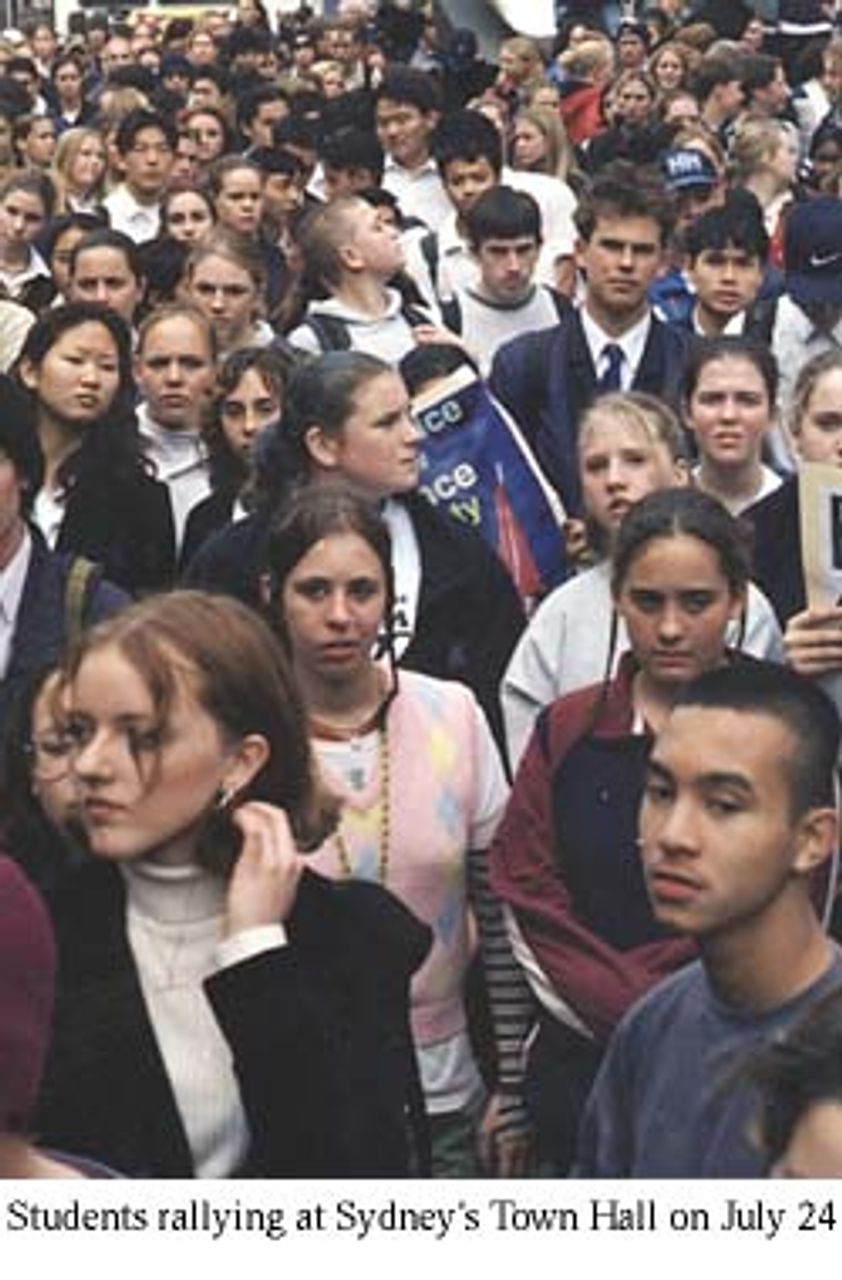 An estimated 10,000 high school students joined 'Rally against Racism' protests in Sydney, Melbourne and other Australian cities on Friday July 24, voicing often passionate opposition to One Nation, a right-wing nationalist party.
An estimated 10,000 high school students joined 'Rally against Racism' protests in Sydney, Melbourne and other Australian cities on Friday July 24, voicing often passionate opposition to One Nation, a right-wing nationalist party.
One Nation calls for anti-Asian immigration controls, welfare cuts and tariff protection. It has one member, Pauline Hanson, in the federal parliament and recently secured 11 seats in the Queensland state parliament. Amid widespread hostility to both the main big business parties -- Labor and Liberal -- almost one in four Queensland electors voted for One Nation. On current polling it could win enough seats in the coming federal election to hold the balance of power.
Almost 3,000 students rallied in Sydney outside the town hall, denouncing One Nation before marching on Prime Minister John Howard's office. In Melbourne, more than 1,500 marched to the state headquarters of the ruling Liberal Party, winning support from white collar and construction workers along the route. Hundreds demonstrated in Canberra, Adelaide, Brisbane, Perth, Wollongong, Hobart and Newcastle.
The average age of those participating was 15, with many as young as 11. They came from various social backgrounds -- from the upper middle class to the working class. Students from the prestigious Methodist Ladies College, Wesley College and other private schools in Melbourne took part, as did groups from government schools in working class areas. Bialik, a private Jewish college in Melbourne, sent four busloads.
While many students defied expulsion threats from principals and education authorities to attend, hundreds of parents provided their children with permission slips to be absent from school. Students from some schools reported that the authorities and teachers had actively encouraged participation, in part reflecting official opposition to Hanson's party.
Slogans on the banners expressed hostility to the extreme right and racism, combined with some nationalist notions. They included: 'Hitler Hanson -- hasn't the past taught us anything?', 'One Nation -- No thanks, all nations', 'Keep Australia Colourful -- No racism'', 'Black, Yellow, White, Purple -- we are all Australians' and 'Don't bleach Australia'. Rarely did they raise broader social issues, such as welfare, education and inequality. One exception was a placard held by two Sydney Girls High students, saying 'Equality is essential'.
The rallies were called by Resistance, an affiliate of the Democratic Socialist Party (DSP), a party formed by ex-radicals who once claimed to be Trotskyists, and were given extensive advance publicity in the mass media. The marches showed growing concern among wide layers of youth about the emergence of One Nation, but also revealed a considerable crisis of political perspective.
Open mike sessions at the rallies saw students vehemently declare their opposition to One Nation. Genuine alarm was expressed over the Hanson movement's immigration policies. However, the speeches were mainly celebratory calls for unity, combined with repeated denunciations of Hanson and her supporters. Some students called for action by the government to outlaw racism; others advocated a ban on One Nation activities.
Speakers from Resistance and the DSP worked consciously to keep the rallies at a low political level. They provided no explanation for the political origins and social roots of the Hanson movement, particularly the role of the former Labor government and its attacks on the social conditions of workers, small farmers and lower middle class people. Nor did they refer to the emergence of extreme right and neo-fascist movements internationally, all seeking to exploit the social discontent produced by mass joblessness and poverty. They promoted the illusion that ongoing protests and a campaign against the Howard government would undermine the Hanson movement.
There was not the slightest suggestion from Resistance of an alternative political program to tackle unemployment and social inequality, let alone any mention of socialism. Instead, Resistance sought to keep the rallies within the framework of a broad anti-Hanson coalition that could well extend to the federal Labor leadership of Kim Beazley and Liberals such as Victorian Premier Jeff Kennett.
The rallies followed earlier demonstrations at the Victorian regional towns of Bendigo and Echuca. In Bendigo, Hanson cancelled a scheduled street walk after a small demonstration swelled to 2,000 when it was joined by students from the nearby Senior Secondary College and Catholic College.
This enthusiastic movement of thousands of high school students into political life has triggered concerns in government circles and sections of the media.
Several newspapers, including the Sydney Daily Telegraph, denounced those supporting the rally, particularly teachers and principals. Media outlets featured comments claiming that militant protests boosted support for One Nation. Those quoted included former longtime prime ministers, Labor's Bob Hawke and the Liberals' Malcolm Fraser.
The day after the rallies, Queensland Labor Premier Peter Beattie called in education department officials and urged parents to direct their children not to attend a rally on July 27 protesting the state parliamentary debut of the One Nation MPs. Despite this, 1,500 school students held a vocal demonstration outside the parliament.
See Also:
High school students discuss One Nation
[30 July 1998]
Australia: Former PM Fraser calls for coalition
[28 July 1998]
Australian politics in turmoil
[11 July 1998]
Extreme right-wing gains in Queensland election
A critical turning point in Australian politics
[24 June 1998]
